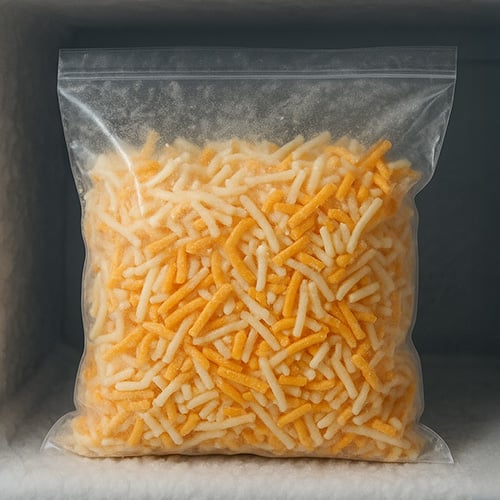Freezing foods is a convenient way to extend their shelf life and prevent waste in a busy kitchen. While freezing cheese is indeed possible, keep in mind that not all types of cheese respond well to freezing. Hard cheeses like cheddar, gouda, and parmesan tend to freeze better than soft cheeses due to their lower moisture content. Soft cheeses such as brie, feta, and cream cheese may become crumbly or watery when frozen, affecting their texture and flavor. Keep reading to learn more about how to freeze cheese properly and how to thaw it when you need it.
Tips for Freezing Cheese

You can freeze just about any cheese with no issues, but when you thaw it out, the taste and texture will be compromised. Even the best cheeses for freezing require some special handling. Check out these tips before you decide to freeze cheese:
- Only freeze surplus cheese that you can't use by the use-by date. Freezing should be used as a preservation method if you find yourself with too much cheese on hand and you want to reduce food waste.
- Once cheese is thawed out, only use it in cooked recipes, like soups, casseroles, or baked goods. You wouldn't want to add defrosted cheese to a salad or a charcuterie board because it won't be the best quality. Save your freshest cheeses for these applications where flavor and texture are paramount.
- Use frozen cheese as the secondary ingredient. If cheese is the main component of the dish, like in a grilled cheese sandwich or creamy cheesecake, you should steer clear of using thawed cheeses.
- Frozen cheeses should only be kept in the freezer for about 6 months. If you keep them frozen longer than 6 months, the taste and texture will deteriorate.
- Thaw frozen cheeses overnight in the refrigerator. Don't put frozen cheese in your recipes and don't attempt to thaw cheese at room temperature. Cheese is considered a TCS food so thawing must be done in a refrigerator where you know the temperatures won't dip into the danger zone.
The Best Cheese for Freezing

When it comes to freezing cheese, not all varieties are created equal. Some cheeses are better suited for freezing than others, maintaining their texture and flavor even after being thawed. If you're looking to stock up on cheeses that freeze well, here's a list of some of the best options:
- Cheddar: Cheddar cheese is a popular choice for freezing due to its firm texture and high fat content. It freezes well and can be used in a variety of dishes after thawing.
- Mozzarella: Whether shredded or in block form, mozzarella cheese freezes well. It's a versatile cheese that can be used in pizzas and pasta dishes.
- Colby: Colby cheese is another great option for freezing. Its mild flavor and semi-hard texture make it a reliable choice for storage in the freezer.
- Swiss: Swiss cheese, with its nutty and slightly sweet flavor, holds up well to freezing. It can be used in sandwiches, fondues, and other recipes even after being frozen.
- Pepper Jack: If you enjoy a bit of spice, Pepper Jack cheese is a good choice for freezing. Its creamy texture and spicy kick make it a versatile option for various dishes.
- Gouda: Gouda cheese is known for its rich, buttery flavor and smooth texture. When frozen properly, Gouda retains its delicious taste and can be enjoyed in a range of dishes.
Can You Freeze Cream Cheese?
Yes, you can freeze cream cheese but it won't be smooth and creamy after you thaw it out. Cream cheese contains a significant amount of water, which can freeze into ice crystals when subjected to low temperatures. As the cream cheese freezes, these ice crystals expand and can potentially break the emulsion that gives cream cheese its smooth and creamy texture. When the emulsion is disrupted, the water and fat in the cream cheese can separate, resulting in a grainy texture that may not be desirable for certain applications.
Can You Freeze Shredded Cheese?

Yes, you can freeze shredded cheese. Freezing shredded cheese is a great way to prevent it from spoiling and ensure that you always have some on hand when you need it. The good news is that most types of shredded cheese freeze well, including cheddar, mozzarella, and pepper jack. To freeze shredded cheese, simply place it in an airtight container or resealable bag, making sure to remove as much air as possible to prevent freezer burn. Label the container with the date so you can keep track of how long it has been in the freezer.
Can You Freeze Ricotta Cheese?
Yes, you can freeze ricotta cheese, but there are a few things to keep in mind. Ricotta cheese has a high moisture content, which can affect its texture when frozen. The best way to thaw ricotta cheese is overnight in your reach-in or walk-in cooler. This gradual thawing process helps prevent the cheese from becoming too watery or grainy. Once thawed, give the ricotta a good stir to help redistribute any separated liquids and restore its creamy consistency. Use it in cooked dishes where the ricotta is incorporated with other ingredients.
Can You Freeze Cottage Cheese?
Even though cottage cheese usually pops up as a cheese you shouldn't freeze, we think it can be done with special handling. We don't recommend serving frozen cottage cheese on its own because the texture is unappetizing. However, you can use thawed out cottage cheese as an ingredient in other dishes as long as you thaw it overnight first. If you incorporate the cottage cheese into pancake batter, a protein-packed smoothie, or a blended sauce, you won't notice the change in texture.
The Worst Cheeses for Freezing
- Brie and Camembert: Both of these soft and creamy cheeses have a high moisture content and tend to become grainy and lose their smooth texture when frozen. The delicate flavors and textures of these cheeses are best enjoyed fresh rather than after being thawed from the freezer.
- Blue Cheese: Known for its bold and pungent taste, blue cheese suffers from texture changes when frozen. The freezing process can alter the consistency of the cheese, making it crumbly and less appealing.
- Feta cheese: A brined cheese with a crumbly texture, feta may become too crumbly and watery when frozen. The freezing and thawing process can cause feta to lose its characteristic tanginess and become mushy.
- Mascarpone: This creamy Italian cheese is commonly used in desserts. After freezing, mascarpone can separate and lose its smooth, velvety texture. It is best to use mascarpone fresh for the best results in your culinary creations.
- Processed Cheese Products: such as American cheese slices or cheese spreads, may not freeze well due to their emulsified nature. Freezing can cause these products to become rubbery or lose their creamy consistency.
How to Freeze Cheese the Right Way
Here are some tips on how to freeze cheese properly in your foodservice kitchen:
- Choose the Right Cheese: Before freezing, consider the type of cheese you have and whether it is suitable for freezing. Refer to our guidance above if you're not sure.
- Prep the Cheese: Cut the cheese into smaller portions or shreds before freezing. This will make it easier to thaw and use later on. For blocks of cheese, consider wrapping them in individual portions for convenience.
- Wrap it Up: Proper wrapping is key to preventing freezer burn and maintaining the quality of the cheese. Use airtight containers or heavy-duty freezer bags to seal the cheese tightly. Make sure to remove as much air as possible before sealing to prevent moisture loss. For the best airtight seal, use a vacuum sealer to package cheese before freezing.
- Label and Date: To avoid confusion and ensure you use the cheese before it goes bad, label each package with the type of cheese and the date it was frozen. This will help you keep track of how long the cheese has been in the freezer.
- Store Properly: Place the wrapped cheese in the coldest part of your freezer, away from other strong-smelling foods. This will prevent the cheese from absorbing unwanted odors and flavors.
- Thawing: When you're ready to use the frozen cheese, transfer it to the refrigerator to thaw slowly. Avoid thawing cheese at room temperature, as this can lead to texture changes and loss of flavor.
Freezing cheese can be a cost-effective solution for businesses looking to manage their food costs efficiently. By following proper freezing techniques and choosing the right types of cheese for freezing, commercial establishments can enjoy the benefits of extended shelf life and reduced expenses without compromising on the quality of their dishes.



